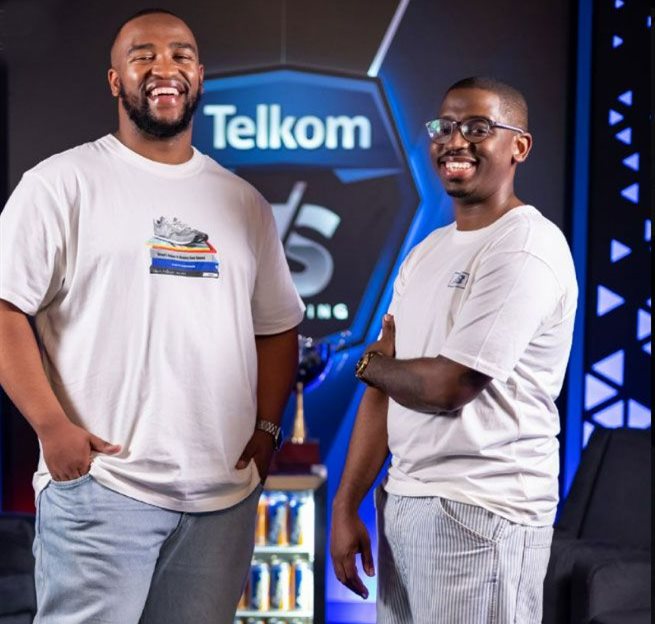
George Mnguni aka ‘Okay Wasabi’ and Sibu Mpanza, co-hosts of
VS Gaming Weekly. Source:
https://twitter.comAs one of the fastest-growing digital networks in Africa, Telkom VS Gaming is a regular tournament organiser for esports in the country and through its partnerships and VS Gaming Weekly, is making esports more accessible. VS Gaming Weekly gives viewers an all-access pass to players, teams as well as the latest in gaming news and trends.
Lifestyle, fashion and gaming YouTuber/content creators George Mnguni, popularly known as ‘Okay Wasabi’, and digital entrepreneur, casual modern gamer and hardcore retro gamer Sibu Mpanza are the duo who host the weekly show.
We caught up with them to find out more about the show and their role as presenters and gaming influencers.
How did you get involved in gaming and what motivated you to contribute to the scene in South Africa?
Mnguni: I’ve been gaming since I was a kid, from the 50c arcade machines in the hood where I grew up and cartridge TV game consoles like the TeleGameStation, all the way to the various Playstation and Xbox consoles I’ve owned. I’ve always loved gaming and I’m still gaming to this day.
Mpanza: Games have been a part of my life for as long as I can remember. I got my first console in 2004. The PS2. The best day of my life! Gaming as a career was never part of my plan, but my passion led me to create gaming content and then to VS Gaming Weekly.
Having hosted three seasons of the VS Gaming Show, how has this expanded your view of the esports space in South Africa?
Mnguni: VSGaming has opened my eyes to how competitive and lucrative the scene is, it’s huge and I’m hoping a platform like VS Gaming only exposes this scene to even more gamers who do not know you can generate an income from doing what you’ve been doing on your couch for so many years.
Mpanza: The show has made me more hopeful for the future of gaming and tech in South Africa. People of all ages are interested in what it means to be a gamer - casual and professional.
How do you see esports evolving in the country in the next few years?
Mnguni: I see more people of colour joining the scene. As access to fibre and other forms of internet grows, we will see a surge of more disadvantaged players joining the scene and changing their lives with gaming
Mpanza: More players, more money, more careers. I hope to see more brands like Telkom stepping up and taking the gaming scene seriously.
Thanks to shows like VS Gaming Show, the esports talent pool in South Africa can be spotlighted on a major broadcast platform - how do you think this impacts viewers and aspiring players?
Mnguni: I’d like to think they’ll see how possible it is, that esports isn’t only an international endeavor. You can literally catch a taxi from Soweto to an esports tournament and compete on the same stage and have the same opportunity as anyone from the global gaming community.
Mpanza: The same way I was inspired to make my YouTube channel a career, I think the show gives people the permission to dream. The platform shows that it is possible to work towards your dream of being a professional gamer. Even the casual gamer can watch the ‘tips & tricks’ segment and be inspired to jump on their console or PC and try what they just learned from the show.
You both started a social media platform called ArcadeZA to show that young Black South Africans also have an interest in esports and tech, amongst other things. Do you feel that efforts to be inclusive are being made in the wider esports space, and if not, what do you think can be done?
Mnguni: Maybe not enough, the price of internet services still needs to decrease and access to consoles needs to be greater. How we will achieve that? I’m not sure, maybe sponsorships? But as soon as that happens, we will see a huge spike in inclusivity
Mpanza: There is definitely a start but not nearly enough. As I mentioned before, more brands need to step up and invest in the youth. There is so much incredible talent that is not being tapped into.
You can’t create a tournament for disadvantaged youth and think it ends there. You always need to think a step further. What languages are the hosts of these tournaments speaking? How will these gamers get there? What is an appropriate time for them to leave and get to their homes safely? How do we ensure they return for future tournaments. You don’t drop 5 PlayStations at a container in Soweto and expect the scene to thrive. You must commit.
Where do you see the future of esports in South Africa?
Mnguni: It will be huge, more players will jump in, and more brands will also jump in meaning it will be more lucrative. I see more South African players competing on international stages. More legends are being born.
Mpanza: If given the space to grow, there’s no stopping it. Bigger and better tournaments. Wider variety of games. More cash prizes. More teams competing at the global level. We have the talent, the question is are we willing to back them?


































